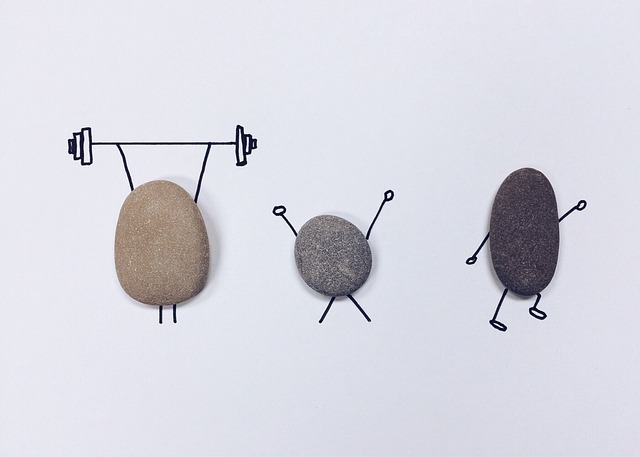Incorporating a diverse range of wellness practices, including mindfulness techniques like meditation and deep breathing, yoga, physical activity, healthy eating, gratitude journaling, and consistent self-care routines, is crucial for building resilience against stress. These holistic approaches enhance mental clarity, reduce anxiety, boost mood, and promote overall well-being by integrating nature, social connections, and hobbies into daily life, ultimately fostering effective long-term stress management.
Cultivating resilience and managing stress is an ongoing practice that requires a holistic approach. In today’s fast-paced world, balancing mental and physical well-being is crucial for navigating life’s challenges. This article explores effective techniques to build resilience and overcome stress. From incorporating nature and social connections to adopting mindfulness practices, we delve into wellness routines that promote overall health. Discover yoga poses, meditation techniques, and self-care rituals designed to enhance mental clarity, reduce stress, and foster a sense of calm.
- Wellness Practices for Building Resilience
- – Exploring holistic approaches to strengthen overall wellness
- – Incorporating nature, social connections, and hobbies into daily life
- Mindfulness Techniques to Calm the Mind
Wellness Practices for Building Resilience

Incorporating wellness practices into your daily routine is a powerful way to build resilience and manage stress effectively. Mindfulness techniques, such as meditation and deep breathing exercises, can help calm the mind and reduce anxiety. Yoga exercises not only improve physical flexibility but also enhance mental clarity and focus. Additionally, engaging in regular physical activity stimulates the release of endorphins, which are natural mood elevators.
Beyond these practices, healthy eating habits play a crucial role in stress management. A balanced diet ensures your body receives all the necessary nutrients to function optimally. Gratitude journaling is another effective strategy; it encourages you to reflect on the positive aspects of your life, fostering a sense of contentment and reducing negative stress responses. Establishing consistent self-care routines, including adequate sleep and relaxation time, further strengthens your resilience against daily stressors.
– Exploring holistic approaches to strengthen overall wellness

In today’s fast-paced world, cultivating resilience and managing stress are essential for maintaining overall wellness. Holistic approaches that integrate various wellness practices can significantly enhance one’s ability to cope with life’s challenges. Mindfulness techniques, such as meditation and deep breathing exercises, have been shown to reduce anxiety and improve focus. Yoga exercises not only promote physical flexibility but also foster mental clarity and calmness. Additionally, engaging in regular physical activity releases endorphins, which can boost mood and alleviate stress.
Healthy eating habits play a crucial role in stress management as nutritious foods provide the body with the necessary fuel to function optimally. Gratitude journaling is another powerful wellness practice that encourages individuals to reflect on positive aspects of life, fostering a sense of contentment and reducing negative emotions. Establishing consistent self-care routines, including adequate sleep and relaxation techniques, can further strengthen resilience and overall wellness. These practices, when incorporated into daily life, create a comprehensive stress management strategy that supports mental, physical, and emotional well-being.
– Incorporating nature, social connections, and hobbies into daily life

Incorporating nature, social connections, and hobbies into your daily routine is a multifaceted wellness practice that significantly contributes to stress management strategies. Regular interactions with nature, such as going for walks in parks or practicing yoga outdoors, have been linked to improved mental well-being and reduced anxiety levels. These mindfulness techniques allow individuals to disconnect from stressful environments and focus on the present moment, fostering a sense of calm. Moreover, engaging in hobbies, whether it’s painting, gardening, or playing a musical instrument, serves as an excellent outlet for emotional expression and promotes relaxation through creative engagement.
Social connections are another vital component of stress management strategies. Maintaining strong relationships and engaging in meaningful conversations can provide emotional support and serve as a buffer against the negative impacts of stress. Healthy eating habits, combined with regular physical activity and deep breathing exercises, further reinforce overall wellness practices. Incorporating activities like meditation practices or gratitude journaling into your self-care routines can also enhance mental resilience and make managing stress more effective over time.
Mindfulness Techniques to Calm the Mind

In today’s fast-paced world, stress has become an inevitable part of our lives. However, incorporating mindfulness techniques into your daily routine can significantly help calm the mind and reduce stress levels. Mindfulness involves being present in the moment, focusing on your senses, and observing your thoughts without judgment. Yoga exercises and meditation practices are excellent tools to cultivate mindfulness. Taking a few minutes each day to engage in deep breathing exercises or follow guided meditation sessions allows you to disconnect from stressors and find inner peace.
Additionally, wellness practices such as gratitude journaling and healthy eating habits play a crucial role in stress management strategies. Writing down things you’re grateful for can shift your perspective and foster a sense of contentment. Incorporating regular physical activity into your self-care routines further enhances mental resilience by releasing endorphins, which are natural mood lifters. Combining these wellness practices with consistent deep breathing, yoga, and meditation can create a robust foundation for managing stress and promoting overall well-being.
Cultivating resilience and managing stress effectively are key to leading a balanced and fulfilling life. By integrating holistic wellness practices such as incorporating nature, fostering social connections, and engaging in hobbies, individuals can strengthen their overall well-being. Additionally, mindfulness techniques like meditation, yoga exercises, and deep breathing can significantly calm the mind and reduce stress levels. Implementing healthy eating habits, regular physical activity, and gratitude journaling into daily routines further enhances these benefits. Embracing self-care routines allows us to navigate life’s challenges with greater ease and resilience, fostering a profound sense of inner peace.
